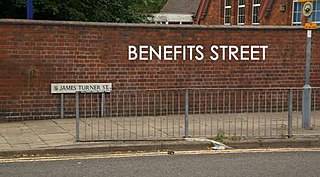 W
WBenefits Street is a British documentary series broadcast on Channel 4. It was first aired on 6 January 2014, and ran for five episodes. The show was filmed by documenting the lives of several residents of James Turner Street, Winson Green, Birmingham, England, United Kingdom, where newspapers reported that 90% of the residents claim benefits. It shows benefits claimants committing crimes, including a demonstration of how to shoplift, and portrays a situation in which people are dependent on welfare payments and lack the motivation to seek reliable employment.
 W
WThe Department for Work and Pensions (DWP) is the British Government department responsible for welfare, pensions and child maintenance policy. As the UK's biggest public service department it administers the State Pension and a range of working age, disability and ill health benefits to around 20 million claimants and customers. It is the second largest governmental department in terms of employees, and the largest in terms of expenditure (£187bn).
 W
WLocal Authority Investigation Officers Group (LAIOG) was a British organisation involving Local Authority investigators. It ceased to operate on 1 December 2016.
 W
WNational Insurance (NI) is a fundamental component of the welfare state in the United Kingdom. It acts as a form of social security, since payment of NI contributions establishes entitlement to certain state benefits for workers and their families.
 W
WThe National Insurance Act 1911 created National Insurance, originally a system of health insurance for industrial workers in Great Britain based on contributions from employers, the government, and the workers themselves. It was one of the foundations of the modern welfare state. It also provided unemployment insurance for designated cyclical industries. It formed part of the wider social welfare reforms of the Liberal Governments of 1906–1915, led by Henry Campbell-Bannerman and H. H. Asquith. David Lloyd George, the Liberal Chancellor of the Exchequer, was the prime moving force behind its design, negotiations with doctors and other interest groups, and final passage, assisted by Home Secretary Winston Churchill.
 W
WThe National Insurance Act 1946 was a British Act of Parliament passed during the Attlee ministry which established a comprehensive system of social security throughout the United Kingdom.
 W
WThe three British National Insurance Funds hold the contributions of the National Insurance Scheme, set up by the Government of the United Kingdom in 1911. It was reformed in 1948 and assumed broadly its current form in 1975, when the separate National Insurance and National Insurance (Reserve) Funds were merged with it. In the Beveridge Report this was the basis of a universal insurance system for all British people. "first and foremost a plan of insurance – of giving in return for contributions benefits up to subsistence levels, as of right and without means test, so that individuals may build freely upon it".
 W
WThe Old-Age Pensions Act 1908 is an Act of Parliament of the United Kingdom of Great Britain and Ireland, passed in 1908. The Act is often regarded as one of the foundations of modern social welfare in both the present-day United Kingdom and the Irish Republic and forms part of the wider social welfare reforms of the Liberal Government of 1906–1914.
 W
WSocial Security Scotland is an executive agency of the Scottish Government with responsibility for social security provision.
 W
WWar pensions are almost certainly the most ancient type of social security. Plutarch's Life of Solon mentions a law which provides that those who are maimed in war shall be maintained at the public charge. Halsbury's Laws of England traced their history back to the days of King Alfred. Until 1978 the British War Pension scheme was run entirely under the Royal Prerogative and completely without legislation.
 W
WThe Welfare Benefits Up-rating Act 2013 is an Act of Parliament in the United Kingdom which places a limit on a range of Welfare benefits in the United Kingdom. It introduces a cap on most working-age benefits, limiting rises to 1% for three years from April 2014, unaffected by inflation. It was enacted by the Parliament of the United Kingdom on 26 March 2013. It aims to reduce welfare spending.
 W
WThe Welfare Reform Act 2007 (c.5) is an Act of the Parliament of the United Kingdom which alters the British social security system. A number of sections come into force two months after royal assent and the first commencement order made under the Act specified that section 31 came into force on 1 November 2007.
 W
WThe Welfare Reform Act 2009 is an Act of the Parliament of the United Kingdom. It reforms the law relating to social security benefits.
 W
WThe Welfare Reform Act 2012 is an Act of Parliament in the United Kingdom which makes changes to the rules concerning a number of benefits offered within the British social security system. It was enacted by the Parliament of the United Kingdom on 8 March 2012.
 W
WThe welfare state of the United Kingdom began to evolve in the 1900s and early 1910s, and comprises expenditures by the government of the United Kingdom intended to improve health, education, employment and social security. The British system has been classified as a liberal welfare state system.